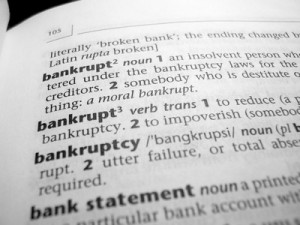 Filing bankruptcy discharges most types of debt. When a debt is discharged the debtor is permanently shielded from liability to the creditor. However, discharging a debt does not remove a lien from property. For example, Chapter 7 bankruptcy will discharge a mortgage loan but since the mortgagee has a lien against the house, if the debtor stops making payments the property will be foreclosed. The home is security for the promissory note held by the lender. If the debtor wishes to keep the property then he needs to continue making payments to the lender or the lender may enforce the lien.
Filing bankruptcy discharges most types of debt. When a debt is discharged the debtor is permanently shielded from liability to the creditor. However, discharging a debt does not remove a lien from property. For example, Chapter 7 bankruptcy will discharge a mortgage loan but since the mortgagee has a lien against the house, if the debtor stops making payments the property will be foreclosed. The home is security for the promissory note held by the lender. If the debtor wishes to keep the property then he needs to continue making payments to the lender or the lender may enforce the lien.
Debtors who file Chapter 7 bankruptcy can choose to reaffirm secured debts. Reaffirmation agreements are contracts between the debtor and a secured lender that survive the discharge. They usually restate the original contract terms but sometimes they can be used to negotiate new repayment terms. Once a debt is reaffirmed the debtor is liable for the debt after the discharge order is signed. Reaffirmation agreements are subject to court approval. If it appears that the debtor cannot afford the debt they are trying to reaffirm then the court will not approve the agreement.
Debtors who wish to keep their home may choose not to sign a reaffirmation agreement but continue to make payments to the creditor. As long as they continue to make payments the mortgage company cannot foreclose on the property. Since a reaffirmation agreement was not signed the debtor is not liable for the mortgage in case of future default. There are downsides to this approach. The mortgage company generally will not report positive payment history to the credit agencies since the debtor is not technically liable for the debt. Also, the creditor may be unwilling to speak with the debtor about their account, refuse to provide access to online services, and failing to reaffirm a debt can make it difficult to refinance the note later on. The bottom line is that keeping a house but not reaffirming the mortgage may be a good financial decision on the part of the debtor but it comes with some inconveniences.